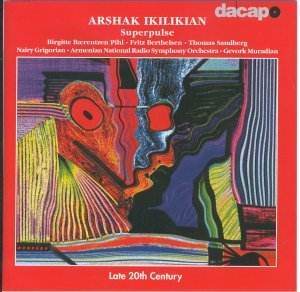 Composer: Arshak IKILIKIAN
Composer: Arshak IKILIKIAN
Works: The Courageous Nazar, Piano Concerto, Superpulse, Success, Crash
Performers: Nairy Grigorian (piano), Gevork Muradian (percussion), Thomas Sandberg (percussion), Birgitte Bærentzen Pihl (violin), Fritz Berthelsen (clarinets)
Recording: Yerevan, 1987 (orch), Aarhus, 2 Nov, 16-17 Dec 1999
Label: DACAPO 8.224181
Arshak Ikilikian, an Armenian composer who has made Denmark his home since 1992, emerges as a compelling voice in contemporary classical music with a distinct fusion of traditional and modernist elements. His works, including “The Courageous Nazar,” a ballet that premiered in 1981, reflect an innovative approach that is both culturally rich and dynamically engaging. This recording, featuring a collection of his compositions, encapsulates his artistic evolution and offers a vivid exploration of his diverse musical language.
The ballet “The Courageous Nazar” is particularly noteworthy for its modernist reinterpretation of narrative and gesture, akin to Prokofiev’s “For the Love of Three Oranges.” The orchestration is vivid, with bright woodwinds and brassy fanfares that paint a dramatic landscape. The performers, under Gevork Muradian’s direction, navigate the intricate textures with precision, allowing the score’s exotic and dissolute qualities to shine. The final moments of the ballet encapsulate a tumultuous yet thrilling climax, where dissonance and rhythmic complexity intertwine, evoking a sense of both chaos and resolution.
In contrast, the “Piano Concerto,” which clocks in at a concise 13 minutes, presents a more introspective side of Ikilikian’s writing. The second movement, marked by a haunting stasis, draws on influences from Schoenberg and Rachmaninov, establishing a lyrical dialogue between the piano and strings that is both contemplative and expansive. Nairy Grigorian’s interpretation reveals a nuanced understanding of the work’s emotional depth, particularly in her delicate phrasing and the subtle interplay with the orchestra, which at times feels almost conversational. The jester-like finale, reminiscent of Shostakovich, is executed with an inviting buoyancy, showcasing the ensemble’s adeptness at navigating the contrasting moods within the piece.
Ikilikian’s foray into electronic music with “Superpulse,” “Success,” and “Crash” demonstrates his willingness to embrace technology while maintaining a humanistic touch. “Superpulse” intricately maps the rhythms of life through an array of sampled sounds that range from alarm clocks to the serene pulse of a heartbeat. This blend of organic and synthetic elements creates a compelling soundscape that invites listeners to reflect on the complexities of modern existence. The engineering quality of this recording allows each sound to resonate clearly, showcasing the detailed sonic palette that Ikilikian has crafted.
“Success” begins with a Schelomo-style violin solo, performed with a deep emotional resonance by Birgitte Bærentzen Pihl, before intertwining with the computer-generated sounds that evoke North African traditions. This melding of acoustic and electronic textures is realized with a finesse that highlights Ikilikian’s skill in orchestrating these contrasting voices. The concluding piece, “Crash,” utilizes clarinet as a lead voice, with Fritz Berthelsen’s performance shining through the intricate layers of sound, including hints of avian motifs that recall Rautavaara’s “Cantus Arcticus.” The meticulous sound design complements the composer’s vision, allowing the listener to appreciate the interplay of timbres and themes throughout.
Ikilikian’s works, though often challenging, reveal a rich tapestry of influences and ideas that resonate with contemporary audiences. His ability to blend traditional orchestration with electronic experimentation reflects a keen awareness of the evolving landscape of classical music. The performers contribute significantly to the realization of this vision, delivering interpretations that are both technically proficient and emotionally engaging. This recording stands as a testament to Ikilikian’s distinctive voice within the realm of modern composition, offering a compelling introduction to his oeuvre for both seasoned listeners and newcomers alike.



